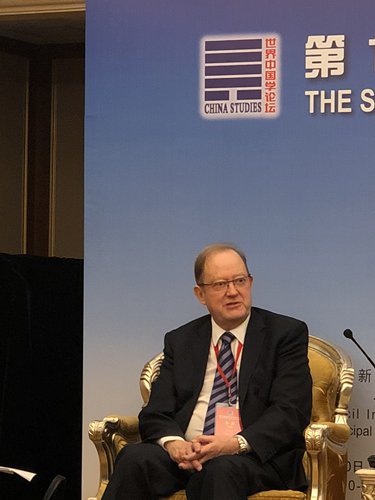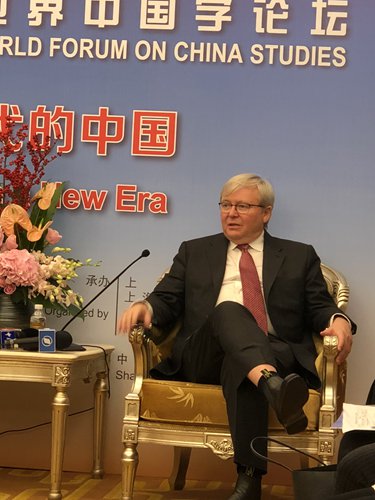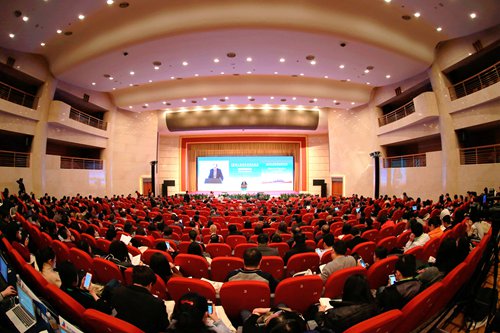Commentaries
Your Present Location: Teacher_Home> John Ross> CommentariesThe new Sinologists of China’s new era
Source: Global Times Published: 2017-12-12
It was announced by Chinese President Xi Jinping in October that socialism with Chinese characteristics had crossed the threshold into a new era, which is a "new historic juncture in China`s development." Indeed, the country has, in recent years, become far more open to the world. China studies have also become a popular subject in international academic and nonacademic fields.
To celebrate this, the seventh World Forum on China Studies was recently held in Shanghai, attracting over 180 China experts and Sinologists from 34 countries and regions, who shared their thinking regarding the development of China and China studies.

John Ross, a senior fellow with Chongyang Institute for Financial Studies of Renmin University of China
"The ocean is vast, for it refuses no rivers," said John Ross, a senior fellow with Chongyang Institute for Financial Studies of Renmin University of China, quoting a Chinese proverb during his speech and explaining that China is one of the largest rivers floating to the ocean of human civilization.
He said that, even though the river didn`t always float with the same strength because of many blockades and problems in history, it is now running very strongly again thanks to the huge sacrifices of the Chinese people and the strong leadership of the Communist Party of China.
Ross believes that the tremendous success of China`s economy has become one of the most important mainstream issues discussed in international economic circles, and that the same process will soon happen aggressively in the nation`s other sectors.

Kevin Rudd, former Prime Minister of Australia and president of Asia Society Policy Institute
Kevin Rudd, former Prime Minister of Australia and president of Asia Society Policy Institute, said at the event that, 35 years ago, foreigners who cared about the National Congress of the Communist Party of China were mainly scholars or diplomats. Today, "almost everybody" is paying close attention to the congress because of China`s peaceful rise.
Listing China`s changes and achievements in many aspects including economy, foreign policy, technology, institutional innovation and space exploration, Rudd contends that China is experiencing a national rejuvenation.

The seventh World Forum on China Studies in Shanghai Photos: Courtesy of Shanghai Academy of Social Sciences and Chen Shasha/GT
The schools of Sinology
"The world now has a natural interest in understanding what China is doing in the world. It directly affects practically every country," Rudd said. "So the international community will want to know more and more what China`s plans are for the future."
"For the last 10 years, since I became Prime Minister of Australia, I have called for development of a new Sinology," Rudd said, explaining that he believes that this new Sinology first means a new emphasis in analyzing and explaining to the world at large what core Chinese concepts actually mean.
"A second characteristic of an effective new Sinology is to properly synthesize information," he said, believing that there are various schools of Sinology due to China`s long history and rich culture.
Rudd suggested that, while preserving the necessary specializations of the various schools of Sinology around the world, a new school, which he described as "China Synthesis, not just China Analyses," should be established.
"A third characteristic of a new Sinology is to break down the artificial barriers which have developed over many decades, which have a rhythm between those who might have been described as `pro-China` or `anti-China,` which is very much of legacy of the Cold War," he said.
He contends that forging common interests and common values across different civilizations and traditions is challenging for the new Sinology, but nonetheless critical for sustaining the global order of the future.
A new generation
Wang Tongsan, professor and former director with the Institute of Quantitative & Technical Economics of the Chinese Academy of Social Sciences, said that in the new era, China studies are facing two questions: what it is going to do and how it is going to do it.
He said that, in the early stages of China`s reform and opening up, people thought about the mistakes that have made China`s economy lag behind. But at this moment, people need to find out the reasons that make China successful in the economic arena.
Wang also argues that it used to be convenient to use common concepts shared by the world to find out its shortcomings, but now China must use its own concepts to tell its own stories and present them to the world.
Feng Da Hsuan, senior research fellow of Nanyang Technological University, Singapore, said that China studies are still lagging behind in theorizing the historical experiences, which requires a new generation of scholars to do more work in this field.
He believes that one of the reasons that China has risen lies in the concerted international cooperation. "Researchers from all over the world can collaborate in China studies as well," he said.
Feng insists that researchers need to find out real solutions to the potential challenges and problems that China could be encountered with in the future.
John Ross is a senior fellow with Chongyang Institute for Financial Studies of Renmin University of China.
Key Words: China Studies; RDCY; John Ross























































































 京公网安备 11010802037854号
京公网安备 11010802037854号





